NCERT Solutions for Class 5 EVS Chapter 11 Sunita In Space
1.What do you think the earth looks like? Make a drawing of the earth in your notebook. On your drawing show where you are. Take a look at your friend’s drawing too.
Ans. The earth looks like a sphere.
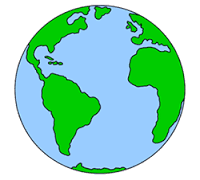
What Do You Think?
1.If the earth is round like a globe, how is it that we do not fall off?
Ans. The gravitational force of the earth attracts everything towards itself. That is why we do not fall off.
2.Do the people in Argentina stand upside down?
Ans. No, they also stand ‘up’ like us. The sense of up and down on the earth is relative.
3.Can you think why Sunita’s hair was standing?
Ans. When we are on the earth, our hairs remain in downward position because of the gravitational force of the earth. Once some is in space, the hairs stand as there is zero gravity in space.
4.Look at Sunita’s photographs and the dates written on each of them. Write what all is happening and when?
Ans.
Classroom Becomes a Spaceship
1.Close your eyes. Imagine that your class is a spaceship. Zooo…m in 10 minutes you have entered in space. Your spaceship is now going around the earth. Now say:
(a) Are you able to sit at one place?
Ans. No, we are unable to sit at one place. Everyone is floating in air.
(b) What about your hair?
Ans. My hairs are standing up.
(c) Oh, look…where are your bags and books going?
Ans. My bags and books are also floating in air.
(d) What is your teacher doing? Where is her chalk?
Ans. My teacher is also floating in air and she is trying to catch the floating chalk.
(e)How did you eat your food during the break? How did you drink water? What happened to the ball that you threw up?
Ans. We had to grab the puri, flying in the air. The water floated in the form of blobs and we had to suck them. The ball I threw up started floating in air.
2.Can you now say why Sunita’s hair kept standing?
Ans. Sunita’s hair kept standing because of zero gravity in the space.
3.Think why water flows downwards on any slope? On mountains too water flows downwards, not upwards?
Ans. Water flows downwards because of the force of gravity of the earth.
MAGIC 1: A tiny paper races a coin
1.Take a 5 rupee coin and a small piece of paper. The paper should be about one- fourth the size of the coin.
• Hold the coin in one hand and the paper in the other. Drop them at the same time. What happened?
• Now place the tiny paper on the coin and drop them. What happened this time? Surprised?
Ans. In the first case the coin fell down more quickly than the piece of paper. In the second case both paper and coin fell down at the same time.
MAGIC 2: A mouse lifts an elephant
To play this you will need a small stone, a bigger stone (lemon-sized), a thick roll of paper (which can be made with layers of papers), mouse and an elephant made of paper.
- Take a string about 2 feet long.
- At one end of the string tie the small stone. Stick or tie the mouse to the stone.
- Put the string into the roll of paper.
- At the other end of the string tie the bigger stone and stick the elephant.
- Hold the roll of paper and move your hand to rotate the small stone.
- Who is pulling whom? You will be surprised! The mouse lifts the elephant!
5.How did this magic happen?
Ans. When the small stone starts rotating it creates a force due to which the bigger stone is pulled up.
Look at this Photograph and Tell
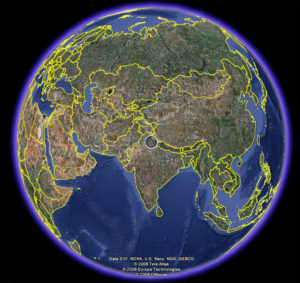
1.Can you see India?
Ans. Yes, I can see India.
2.Can you recognise any other place?
Ans. Yes, I can recognise Sri Lanka.
3.Where is the sea?
Ans. The blue part of the picture shows the sea.
4.Do you find anything similar between the globe and this picture of the earth? In what ways are they different?
Ans. The similarity is that land and sea can be easily distinguished. The difference is that it is difficult to recognise a particular country or city.
5.Do you think Sunita could make out Pakistan, Nepal and Burma separately, when she saw the earth from space?
Ans. No, I think she could not make out these countries when she saw the earth from space.
Look at a Globe in your School
1.Can you find India?
Ans. Yes, I can easily find India.
2.Where all do you find the sea?
Ans.The sea is shown by blue colour on the globe.
3.Which countries can you see?
Ans.I can see all countries. Some examples are—USA, UK, France, Canada, South Africa, Pakistan, etc.
Can you see some of the countries with which India plays cricket matches? For example—England, Australia, Pakistan, Bangladesh and South Africa. Ans. Yes, I can see these countries.
4.What else can you see on the globe?
Ans.Besides sea and countries, I can see mountains, islands, etc. on the globe.
Look at the Map Given in this Book and Tell
1.Can you find the state in which you live? Write its name on the map.
Ans.Yes, I can find the state in which I live. It is Uttar Pradesh.
2.Which are the states next to the state you live in?
Ans.Uttarakhand, Delhi, Haryana, Madhya Pradesh, Chhattisgarh, Bihar and Jharkhand are next to my state.
3.Have you been to any other state?
Ans.I have been to many states; like Delhi, Madhya Pradesh and Kerala.
4.Shahmir thinks that there are lines drawn on the ground between the states. What do you think?
Ans.These lines are just on the maps and are not on the ground.
5.Why don’t you try to do the same with a coin? How many centimetres away from the eye did you keep the coin to hide the moon?
Ans.When I kept the coin at about 25 cm from my eye, the moon completely
Think
1.Do you think the moon is flat like the coin or round like a ball?
Ans.I think the moon is round like a ball.
Look at the moon tonight and draw what it looks like. Look and draw again after one week, and then after 15 days.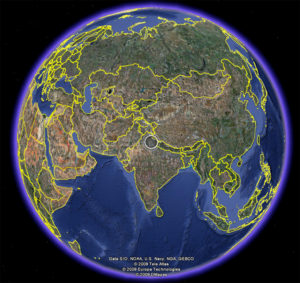
Find Out
1.When is the next full moon? At what time will the moon rise on this day? What does the moon look like on this day? Draw it.
Ans. The next full moon is on 24th of this month. It will rise just after the sunset. The full moon looks like a complete circle.
2.What are the festivals related to the moon?
Ans. Many festivals are related to moon; like Holi, Eid, Karwa Chauth, etc.
3.At night look at the sky carefully for five minutes.
(а) What could you see?
Ans. I could see the moon and the stars.
(b) Did you see anything moving in the sky? What do you think it could be? A star or a shooting star or a satellite (Satellites are used for the TV, telephones and for weather reports). Find out more about this.
Ans. Yes, I saw something moving in the sky. The thing which appears to cross the sky quickly is a shooting star. The satellite looks like a moving tiny dot which appears to move very slowly.
Look at the Table and Tell
1.Given below are the times at which the moon rises and sets in Delhi (on the given days).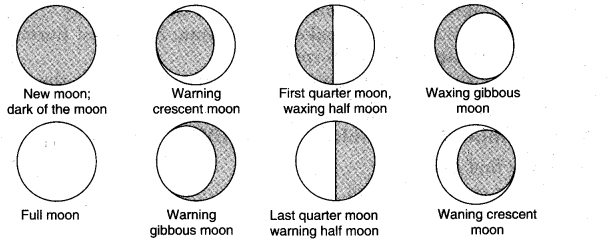
(a) On 28 October the moon came out at……minutes past……O’clock.
(b) On 29 October the moon came out at……minutes past……O’clock.
(c) On 29 October there was a difference of hours……and…….minutes
in the time of the moon rise (as compared to 28 October).
Ans. (a) 16 minutes past 7 O’clock
(b) 17 minutes past 8 O’clock
(c) 1 hour and 1 minute.
2.If you saw the moon rising at 7 pm today, would you see it at the same time tomorrow?
Ans. No, I would not see the moon at the same time tomorrow.
3.On 31 October the time of setting of the moon is given as 12 : 03. Have you ever seen the moon at 12 in the afternoon? Why don’t we easily see the moon or stars during the day?
Ans. No, I have never seen the moon at 12 in the afternoon. During the day, the sunlight is too much and hence we are unable to see the moon or stars.
An Interesting Photograph
1.See how the earth is looking. Can you see the surface of the moon? Do you have some questions after looking at this picture? Write down those questions and discuss them in the class.
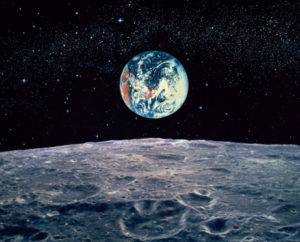
Ans. I can see the surface of the moon. The following questions come in my mind:
(а) Who took this picture and from where did he take it?
(b) How does the surface of moon look in real life?
(c) Is there water or air on the moon?
What We Have Learnt
1.Why do children always slide down the slide and not slide up? If this slide were there in Sunita’s spacecraft, would children slide like this? Why?
Ans. Children always slide down the slide and not slide up because of the gravitational force of the earth. If this slide were in Sunita’s spacecraft, then children would not be able to enjoy the slide because of zero gravity in the spacecraft.
2.Why do we see stars mostly at night?
Ans. There is no sunlight during the night. As a result the light from stars is not hidden by the sun’s glare and we are able to see them at night.
3.Looking at the earth from the space, Sunita said, “Different countries cannot be seen as separate from here. These lines are on paper. They are made by us”. What do you understand by this?
Ans. Boundaries between nations are created by humans. The nature has made a single earth where there is no boundary. All of us are same, ‘The inhabitants of the earth’.